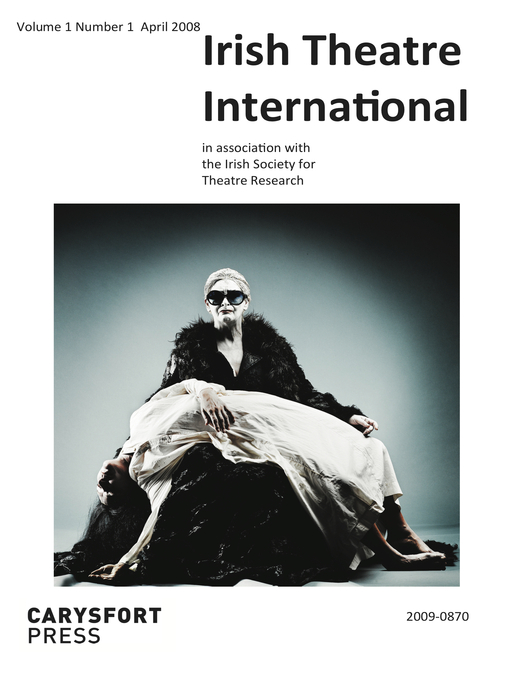This inaugural issue of Irish Theatre International reflects the full spectrum approach in terms of the engagement with theatre and performance from page to stage. In 'Witnessing Change: Public Life and Performance in These Times,' Janelle Reinelt engages with the disciplinary debate regarding performance analysis, specifically whether terms such as 'theatre studies' or 'performance studies' are pertinent appellations, and whether expanding the remit to include 'cultural performances' will dilute the field and make it indistinguishable from cultural studies or sociology. Reinelt suggests that rather than what should be included or excluded from the field of enquiry, the focus should be on what theatre and performance studies can contribute to other fields. It is from this premise that Reinelt analyzes the recent paradigm shift in the political landscape of Northern Ireland, in terms of media representations of the détente between Nationalist and Loyalist factions as public performances for global spectators. In 'The Unbearable Darkness of Being: Marina Carr's Woman and Scarecrow,' Melissa Sihra explains how Woman and Scarecrow is a distillation of Carr's entire canon since her first play Ullaloo (1988). Sihra suggests that in Woman and Scarecrow we witness the arc of a life crystallized in extremis, where the death of the protagonist 'Woman' manifests Carr's fundamental theme, namely the death of self concomitant to lack of fulfillment in life. Sihra maintains that in Carr's dramaturgy it is only via the ultimate act of death that the 'deathliness' of futile existence can be cleansed and a profound awareness of life can emerge. Ondřej Pilný's 'My Kingdom for a Pun: Myles na gCopaleen, Erwin Schrödinger and The Third Policeman in Improbable Frequency' examines one of the highlights of recent Irish theatre, specifically the Rough Magic Theatre Company production of Arthur Riordan and Bell Helicopter's Improbable Frequency. After an initial discussion of the provocative features of the play and the fact that they did not result in any controversy, Pilný turns his attention towards the serious note which underlines the hilarity and apparent levity with which the musical genre may seem to treat the controversial political topic. Pilný argues that one of the essential components of the play's message apropos of neutrality and contemporary Ireland is determined by intertextual links with the work of Flann O'Brien (Myles na gCopaleen) and Erwin Schrödinger. In 'Shirley Temple Bar at the Abbey: Irish Theatre, Queer Performance and the Politics of Disidentification,' Fintan Walsh deals with the position of queer performance and homosexuality within Irish theatrical culture and its wider context. Walsh focuses on the public talks held at the Abbey Theatre in 2007 which accompanied the production of Sheridan's The School for Scandal and were programmed under the theme of 'Transgression.' The cross-dressing performer Shirley Temple Bar was chosen to lead the event which highlighted tensions regarding the portrayal of homosexuality in Irish theatre and performance. Walsh examines these tensions by considering some of the issues which the event raised, particularly whether the spectacle of a cross-dressing, gay performer substantiated The School for Scandal's cogitation on the facade that veils corruption. Mark Phelan's 'Gerald MacNamara and the "Necessity for 'De-Hyderating' the Revival"' suggests that a critical re-evaluation of the Northern Revival and the Ulster Literary Theatre (ULT) can significantly reaccentuate an understanding of the Irish Renaissance.
- Available Now!
- Newly Added eBooks
- New Kids and Teen eBooks
- Most Popular eBooks
- Try Something Different
- Newly Purchased
- See all ebooks collections
- Available Now!
- Newly Added Audiobooks
- New Kids and Teen Audiobooks
- Most Popular Audiobooks
- Try Something Different
- Newly Purchased
- See all audiobooks collections
